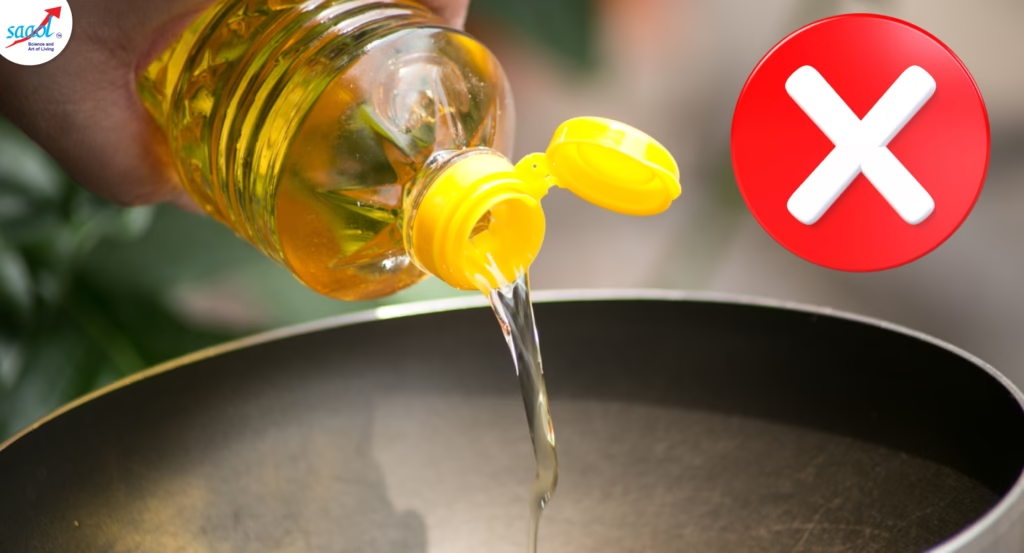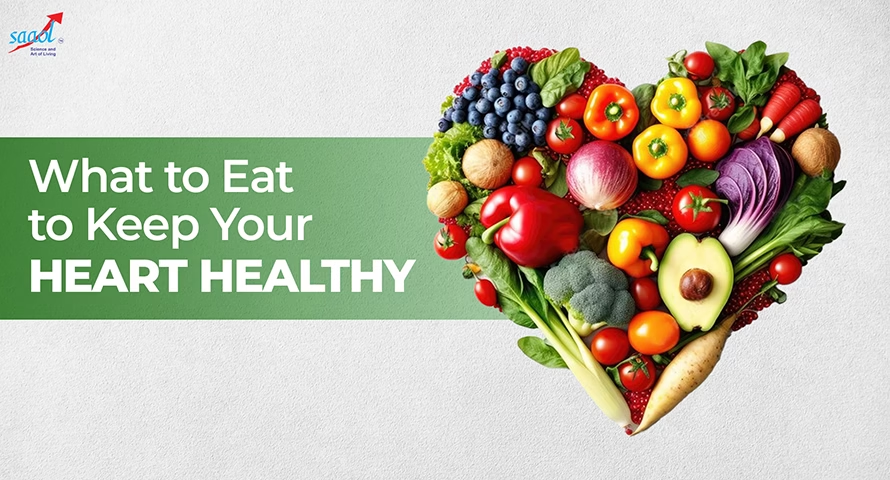Never have you ever thought in your entire life that you would be searching for heart-healthy foods! Right? That you would fear your favourite food! Unfortunately, that’s the reality of 2025.
If you are reading this, you or someone near and dear to you has likely heard words like “Heart blockage,’’ “angiography’’ or “cholesterol too high.’’
It’s the moment everything stops for a second, you see the reports, but the numbers don’t add up, and your mind starts to race:
“Will I ever be able to eat normally?”
“Will I always live in fear of another heart problem?”
At SAAOL Heartcare Delhi, every patient that we successfully treated walked in with that same fear; they were extremely confused and anxious, and had no idea what to eat or what not to eat.
Well, don’t worry, you can definitely enjoy food again; in fact, the proper food can become your most potent heart medicine. This blog will help you understand exactly what to eat to keep your heart healthy, with expert guidance from our doctors and dietitians.
What Is a Heart-Healthy Diet?
A heart-healthy diet, also known as a cardiac diet, helps to control cholesterol, blood pressure, and circulation, while also helping you manage your weight without additional strain on the heart.
It’s like this: If your heart is an engine, food is the fuel. The cleaner the fuel, the more life you get out of your engine.
A heart patient’s diet includes:
- More fruits and vegetables
- Whole grains, millet, not refined flour
- Natural plant-based proteins such as pulses, tofu, sprouts, etc.
- Limited salt, sugar, and processed foods
It’s straightforward, achievable, and sustainable; it is not a “diet plan,” but rather, a heart healing plan.
If you are looking for a personalized diet consultation, our SAAOL Delhi expert nutritionists, like Garima Arora, can help you design a balanced meal plan that works with your schedule and preferences.
Why Food Is the Real Medicine for the Heart
You are probably reading this for the first time, but the World Heart Report states that around 80% of premature heart disease and stroke can be prevented by addressing modifiable risk factors like primarily unhealthy diet, physical inactivity, tobacco/nicotine use, and excess alcohol.
So, the matter of fact is, they don’t start in your arteries (though it will feel like they did), they start in your kitchen. Every oily paratha, extra spoon of ghee, and fried snack adds up. Over time, these foods elevate cholesterol, send triglycerides through the roof, and harden blood vessels, triggering heart blockages and painful angina.
Symptoms of heart disease today can be controlled, but you cannot heal your arteries unless you change what you eat. That’s why SAAOL’s non-surgical EECP Treatment, along with proper cardiac diet, Zero-oil cooking, gives results where surgeries often can’t, by improving blood flow and reversing the root cause.
In short, your plate determines your pulse.
Best Foods for Heart Health
Let’s make this practical. Here’s what your heart really wants, and these same foods have been proven to prevent heart attacks, so read carefully!
Fruits Good for the Heart
- Fresh fruits are nature’s medicine cabinet. Apples, guavas, pomegranates, oranges, amla, papaya, and berries are rich in fiber and antioxidants that help down the levels of bad cholesterol.
- The potassium in bananas also helps to keep blood pressure under control.
Aim to get 2-3 servings per day. Avoid canned or packed fruit juices (they’re full of sugar).
Vegetables Good for the Heart
- The greener, the better. Spinach, fenugreek leaves (methi), broccoli, bottle gourd (lauki), and bitter gourd (karela) support the detoxification of the body and the flexibility of arteries.
- Beetroot is really good for your circulation; it works to naturally expand blood vessels. But ensure you cook/boil it before eating. Never eat raw. Fill half your plate with vegetables at every meal.
Whole Grains, millet, and Fiber
White refined flour, white rice, and bakery items elevate sugar and triglycerides. Replace them with:
Oats, Brown rice, Daliya, Millet (Bajra, jowar), Whole wheat. These slow the absorption of sugars and boost cholesterol levels.
Protein Sources
Protein aids in tissue repair and keeps the heart muscle strong. It is best to consume plant-based protein like pulses, lentils, sprouts, tofu, and, in moderation, paneer and soy.
Spices and Herbs for the Heart
Indian kitchens already hold magic.
- Turmeric reduces inflammation.
- Garlic helps lower cholesterol.
- Fenugreek seeds and cinnamon also help in managing sugar levels.
These are all true foods for heart health – simple, local, and potent. Heart disease prevention occurs years before the disease appears. You can cut your risk of a heart attack by 50–60% strictly from what you eat.
Food for Heart Attack Patients
Firstly, we hope you didn’t have to read this. A heart attack is unfortunate and leaves you and your family in physical and emotional shock that is hard to recover from. But SAAOL Heartcare is here to help you every step of the way. Dr. Vishal Sharma, Senior heart specialist, COO, SAAOL heartcare, says that your body is in recovery mode after a heart attack, which means that it needs more nutrients. It requires gentle, nourishing foods that help it heal.
Eat: (after confirming with your heart doctor)
- Light soups (vegetable or dal)
- Steamed vegetables and salads
- Whole-grain khichdi with zero oil
- Papaya, apple, pomegranate, etc, fruits
- Plenty of water and herbal teas
Avoid:
- Fried and spicy foods
- Red meat, processed meats
- White sugar, white bread, and a cold drink
- Salted snacks and pickles
If you have had a heart attack recently, your doctor may also recommend EECP treatment, which is a safe, non-invasive way to improve blood flow and strengthen weak heart muscles.
What Not to Do for a Healthy Heart

Even the healthiest foods won’t work for you if you keep up harmful habits. Bitter but true!
Limiting the below is not enough anymore, so completely avoid:
- Refined oils, vanaspati, butter, and margarine – they clog arteries.
- Packaged foods, chips, and bakery snacks – full of trans fats and salt.
- Sugary drinks and desserts – raise blood sugar and triglycerides.
- Smoking and alcohol – reduce oxygen supply to the heart.
- Stress and anger – as harmful as junk food for your arteries.
If you feel tired, short of breath, or have frequent chest tightness, do not ignore it. Visit a SAAOL heart center near you for evaluation.
How SAAOL Heartcare Can Help You Heal Beyond Diet
The philosophy at SAAOL Heartcare Delhi is “Don’t only treat the disease, heal the person”.
Our complete non-invasive heart disease treatment includes:
- EECP Therapy – Improves blood flow without surgery..
- Diet Consultation – Individualized cardiac diet from the best nutritionists in Delhi/NCR.
- SAAOL Detox Therapy – Removes all toxins that load your heart.
- Patient Education – Information on how to manage stress, yoga, and exercise.
Collectively, these techniques work to naturally clear blocked arteries and help you start living again, free from heart attack fear without surgery or stents.
Conclusion
Your heart is a natural wonder; it beats more than 100,000 times a day without ever taking a break. The least we can do is to nourish it properly. Start small. Switch to zero oil. Add one fruit a day. Drink water. With just selective Indian foods, after just a few weeks, you’ll feel more energy, lighter digestion, and calmer sleep.
And remember, as Dr. Bimal Chhajer quotes, “a healthy heart doesn’t necessarily only come from medicine; it comes from living a mindful life.”
Frequently Asked Questions (FAQs)
Q1. What are the best heart-healthy foods?
Fruits such as pomegranate, apple, guava, orange, and vegetables, including spinach, broccoli, and carrots, are good. Regularly consume millet, whole grains, and fibre-rich foods.
Q2. What should heart attack survivors eat every day?
Vegetable soups, whole grains, fruits, and boiled veggies are the ideal meal at this time. Avoid fried or salty foods. Strictly follow your doctor’s recommendations.
Q3. Are eggs bad for your heart?
Eggs are a good source of protein, but several plant-based alternatives have a high amount of protein and provide better protection for the heart.
Q4. Can heart health be improved with EECP treatment?
Yes. EECP (Enhanced External Counterpulsation) is a nonsurgical procedure for improving coronary artery circulation, relieving angina, and, in certain cases, facilitating diastolic heart failure.


